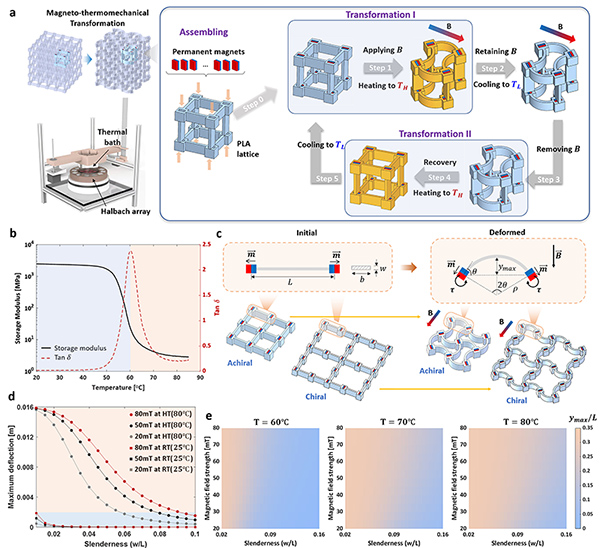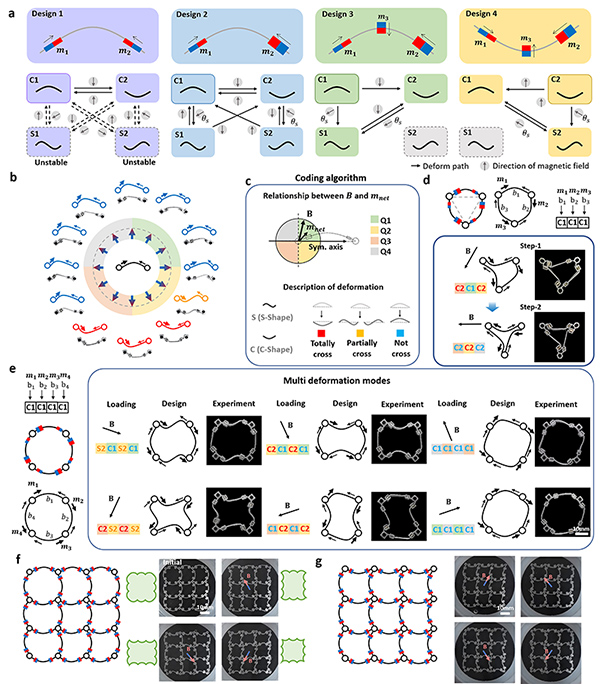The University of Michigan – Shanghai Jiao Tong University Joint Institute (UM-SJTU JI, JI hereafter) Associate Professor Jaehyung Ju and his team have published a research article titled “Magneto-Thermomechanically Reprogrammable Mechanical Metamaterials” in Advanced Materials, a top journal in Engineering, Physical Science, Materials Science, with a 2021 impact factor of 32.086. The research team constructed and demonstrated a magneto-thermomechanical tool that enables a single material system to transform with untethered, reversible, low-powered reprogrammable and shape-locking deformations via the application of magneto-thermomechanically triggered prestress on a shape memory polymer (SMP)and structural instability induced by asymmetric magnetic torque.

Work mechanism of magneto-thermomechanically reprogrammable mechanical metamaterials

Principles of reprogrammable design
Future intelligent materials for reconfigurable structural applications require fast, untethered, reversible, reprogrammable (multimodal), and interactive transformability with shape locking. SMPs have the potential for lightweight yet stiff small-scale structural applications over other programmable materials such as hydrogels and elastomers due to SMP’s thermally stiffening effect. However, conventional SMPs have a critical drawback –irreversible transformability, limiting their reconfigurability as intelligent materials. Magnetic control has an excellent advantage in the untethered and fast deployment, yet a significant drawback is an additional power required to hold the transformation.
The research team led by Professor Jaehyung Ju combined two physics – magnetic control and thermomechanical behavior of SMP and demonstrated mutual assistance to each other without new materials synthesis. The research team proposed a method that couples a localized magnetic torque with the prestressing of SMP lattice structures in a fully noncontact triggering manner, eventually providing untethered and reversible deformations of lattice structures with shape locking. In addition, a novel reprogramming strategy of active structural material is proposed, which couples the asymmetric arrangement of magnetic moments with structural instability. This strategy further avoids the need for additional high thermal power and extended time for reprogramming. Therefore, this work opens a new path of active metamaterials, flexible yet stiff soft robots, multimodal morphing structures, and mechanical computing devices which can be designed in reversible and reprogrammable ways.
Jaehyung Ju is the paper’s corresponding author. JI doctoral student Bihui Zou is the first author of the research article with co-authors of four JI graduate students including Zihe Liang, Dijia Zhong, Zhiming Cui, Kai Xiao, and Shuang Shao who was an undergraduate researcher of JI and is now a graduate student at the University of California at Berkeley. The research work was funded by the Shanghai National Science Foundation, the National Natural Science Foundation of China, and the Research Incentive Program of Recruited Non-Chinese Foreign Faculty by Shanghai Jiao Tong University.
Personal Background

Jaehyung “Joshua” Ju is an associate professor of the UM-SJTU Joint Institute. He received his Ph.D. degree from Texas A&M University in 2005. Prior to joining JI in 2016, he worked as a postdoctoral research associate in Texas A&M University and Clemson University, and an assistant professor in University of North Texas. Jaehyung Ju received Jason Daida Teaching Excellence Award in 2019. His research interests include mechanical metamaterials, 4D printing and nonpneumatic tires. He has published papers in top-tier journals, e.g., Nature Communications, Advanced Materials, Advanced Functional Materials and Journal of the Mechanics and Physics of Solids.





